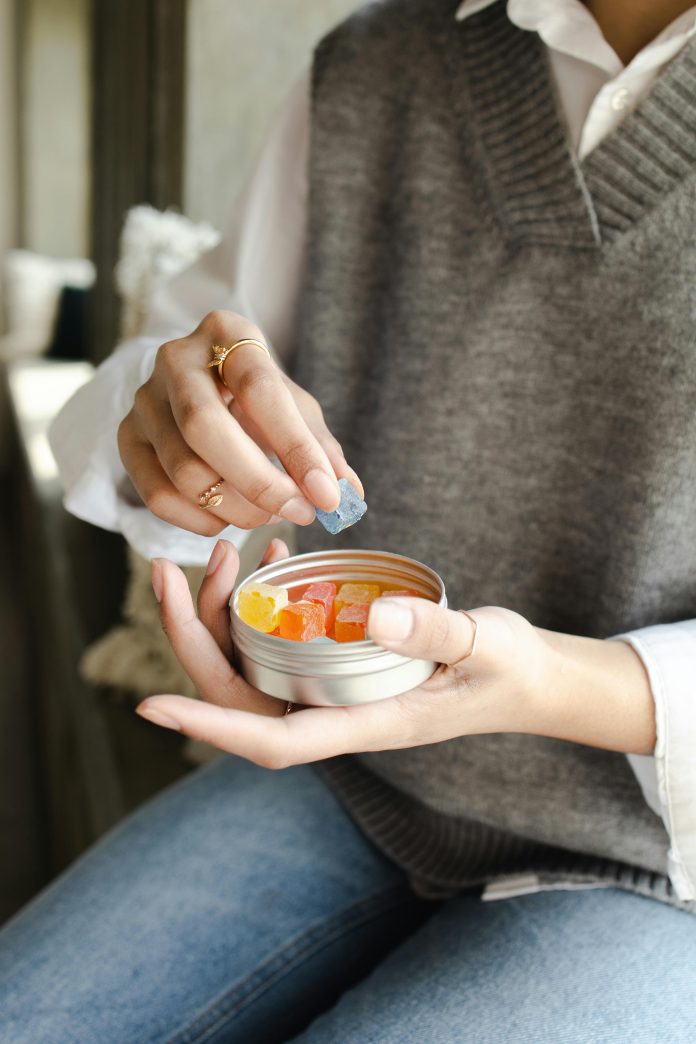
While some portions of a new bill tightening Iowa’s laws and regulations on consumable hemp products are being praised as “no-brainer” measures, retailers specializing in the sale of such products say the overall bill could severely impact their ability to remain in business.
“We’ve tried to show the state the right way to do it over these years,” said Jake Winsor, owner of Winsor CBD in Vinton. “And within two months’ notice, we’re going to be basically out of business.”
Iowa House File 2605, passed by the Iowa Senate on a 31-18 vote April 2 and awaiting Iowa Gov. Kim Reynolds’ signature, would put a limit of 4 milligrams of tetrahydrocannabinol (THC) per serving in consumable hemp products, as well as a 10-milligram THC limit per container – in addition to requiring warning labels on such products.
Current Iowa law allows the sale of consumable hemp products with THC levels below 0.3%.
The bill also imposes an age limit of 21 to purchase THC-infused products – current state law has no minimum age requirement – and adds new restrictions and penalties related to the possession, sale and manufacturing of hemp products.

Mike Thorson, owner of Don’t Worry, Be Hempy in Cedar Rapids, termed the new age restriction on THC-infused product purchases a “no-brainer.”
“It’s an intoxicating product,” Mr. Thorson said, “and we’ve treated it that way ever since we brought it into our store. We were self-regulating, even before they put a law in place.”
Alec Travis, co-owner and head brewer of Field Day Brewing in North Liberty, which debuted three versions of its cannabis-infused beverage, Day Dreamer, in February, agreed that the age restriction was long overdue.
“It’s absolutely ridiculous that they even got as far as they did, and you could sell these products to kids,” Mr. Travis said. “That was obviously something very important that needed to happen. They tried to add many things into the legislation to get it tightened with the age limit, so we’re happy with that.”
But many local consumable hemp entrepreneurs say the bill approved by the Legislature sets an unnecessarily low limit on THC levels, and by restricting the “per-package” THC limits, many products now sold in quantities up to a 30-day supply will have to be drastically repackaged to quantities as low as two or three days’ supply.
Some lawmakers say restrictions are long overdue
Sen. Dan Dawson, R-Council Bluffs, the bill’s floor manager, said updating the Iowa Hemp Act is necessary not only to regulate the growing industry, but also to ensure that people are not misusing hemp products as a substitute for the state’s medical cannabidiol program.
“The medical cannabidiol program actually puts an individual with a doctor to get these products, that’s the biggest distinction,” Mr. Dawson said. “The Iowa hemp program has none of those barriers there. So if we want to protect Iowans with these products … there has to be some type of guardrails on here, to make sure that the medical cannabidiol program is the program that we can direct Iowans to when they have one of these diagnosed conditions.”
Although Democratic senators voted against the bill, none spoke in opposition to the legislation during floor debate.
During House deliberation on the bill in March, Rep. John Forbes, D-Urbandale, said he was concerned about “unintended consequences” of the bill’s limitations on hemp products for people who use them for medical purposes outside of the medical cannabidiol program, like those who use products containing CBD or THC while recovering from opioid addictions.
“I think we’re not hitting the nail on the head here, when it comes to being able to help Iowans that are seeking out this as an alternative to maybe taking other prescription medications, and increasing quality of life, helping them,” Mr. Forbes said.
There were not only concerns about potential medical misuse of hemp products, but about the safety or recreational use of inebriating products derived from hemp. Mr. Dawson said that the bill is “desperately needed regulation on this industry, to not only protect the industry but also to protect the consumers who might indulge in these products.”
Sen. Tom Shipley, R-Nodaway, said that when he worked on the original Iowa Hemp Act, passed in 2019, he knew there were “some nefarious motives behind this,” with businesses hoping to sell products not accounted for by the law.
“We found out some people could find an angle to get around things and do things that are not good for Iowans,” Mr. Shipley said. “And I just want to stand up in support of Senator Dawson’s bill to try and close some of these loopholes that even I could figure out were coming.”
In addition to the new restrictions on hemp products, Iowa lawmakers have also considered a bill that would add an excise tax on consumable hemp products. Senate Study Bill 3186, passed by the Senate Ways and Means Committee, would set a 2.5% “sin tax” on the sales price of consumable hemp products. Mr. Dawson said in the March committee meeting that the measure would address current tax disparities between alcohol and hemp product retailers.
Some lawmakers brought up concerns with the proposal’s economic impact on Iowa businesses. Rep. Bob Kressig, D-Cedar Falls, said the legislation could affect 1,100 Iowa retailers who currently stock consumable hemp products and who employ roughly 3,000 people.
Requirements on warning labels and restrictions on how much THC can be contained in packaging could stop manufacturers from selling hemp products in Iowa, he said, leading consumers to go outside the state for purchases.
“I’m hearing it from the retailers, saying this,” Mr. Kressig said. “When they close, they’ll lose the employees, the customer won’t be able to purchase that product from a knowledgeable individual. And they’ll have to order it online or maybe go — oh, I guess they could go to Minnesota. They could go to Illinois. They could go to Missouri. Those states offer products to the people.”
Senators also passed Senate File 2335 April 2, a bill expanding the maximum number of medical cannabidiol dispensary licenses in the state from five to 10. While a previous version of the legislation would have restricted licensees to having a maximum of three licensed dispensaries, the Senate amended the bill to remove this requirement.
Sen. Scott Webster, R-Bettendorf, said the cap was removed as industry advocates said they would be able to offer products at reduced prices if they are allowed to operate at a larger scale.
Business owners frustrated by hasty approval, lack of input
Mr. Winsor said when he first opened Winsor CBD, he worked closely with state officials to ensure his offerings, and packaging, complied with state regulations.
“The state had to pass my products and labels before I could even open my doors years ago,” Mr. Winsor said. “All my products are served on a per-serving basis, obviously at 0.3% or less (THC) per serving. Now, with the new verbiage, the four milligrams per serving and no more than 10 milligrams per container, that is going to affect five of the six current products that I sell.”
Mr. Thorson, who launched his business in 2019 after the 2018 Farm Bill removed hemp containing 0.3% of THC or less from the controlled substance list, said up to 80% of his products would be impacted by the new state measures.
He noted that in 2019, he only sold products containing cannabidiol (CBD), which provides therapeutic benefits but doesn’t provide a “high.”
Products containing THC have just been introduced in Iowa in the past year or so, he said.
“A lot of people went through the 2018 Farm Bill and saw that there was no restriction on the cannabinoids that you could extract,” Mr. Thorson said. “That’s why all of these states incrementally are enforcing rules and regulations now, in the past tense, because there was nothing in the Farm Bill addressing the subject.”
Mr. Winsor said his CBD business is different from some others because it’s locally-produced and locally-controlled.
“We actually farm and grow it all ourselves right here in Benton County,” he said. “We do everything from seed to shelf. There’s really a ton of great businesses out there, but then again, there are some businesses trying to break the rules, which is exactly why I feel we’re in the situation, with some of these products coming out that are just too high in their potencies.”
Because of its locally-sourced product, Winsor CBD is considered a consumable hemp manufacturer, Mr. Winsor said.
“We farm it, and once we have our field harvested and we get our test results back from the state of Iowa, then we have the plant material extracted into a distillate, which we then ship off to our product manufacturer and have our own distillate made into these products,” he said. “And as strict as they’ve made it, I feel like those are all necessary steps. Consumers are ingesting this stuff into their bodies, and giving those customers complete peace of mind is 100% what you need in a good CBD product.”
Mr. Winsor, however, said he believes there are other motives behind the new restrictions.
“I think they’re basing their decision off their personal belief, and that’s where there needs to be more information and education brought forth about this,” he said. “Plus, they’re doing nothing with the medical cannabis program within the state. They’re going to still be able to operate in the same capacity.”
While Mr. Thorson said some consumable hemp consumers are buying the products for their intoxicating qualities, he said his business has helped hundreds of people deal with a variety of ailments, including anxiety, PTSD, fibromyalgia, multiple sclerosis and even cancer.
“I have customers that refuse to take toxic medications,” he said. “We’ve dealt with three or four cancer patients, and we helped them at the end of their days. All that we got from their family members was ‘oh, my God, my mom was able to remember this and talk about that, or my dad was able to play with my kid for a little bit longer.’ You’re not in this type of industry to just keep people high. That’s not what I’m here for.”
Becky Ramker, who owns Your CBD Store locations in Cedar Rapids, Iowa City, Davenport and Rock Island and first opened in 2018, estimated that “about 70%” of her store’s products would have to be repackaged under the new state regulations, leading to higher costs for her stores and customers.
She said her chief frustration with the new law is the haste of its approval, and the lack of input from the state’s consumable hemp producers and merchants.
“Most of them won’t even let us explain our products,” she said. “They don’t understand. If they knew what our products are compared to what they think they are, they would have a different outlook. They keep saying all these people are ending up in the hospital because they’re overdosing on THC. Our stuff doesn’t do that. But now, it’s probably going to come down to people getting it on the streets, and the overdoses are going to come from fentanyl and products like that. They just wouldn’t listen to us.”
Ms. Ramker said Your CBD Store will likely have to close a few Iowa locations once the new laws take effect.
Scott Booher of Four Wind Farms of Amana, a hemp product grower and manufacturer, said during the legislative debate that while he understood the concerns about businesses that are not complying with Iowa law, the bill would cause law-abiding businesses to get “swept up in collateral damage.”
He pointed to portions of the bill restricting minors from access to all hemp-derived products — including ones that do not contain THC. Some of his customers are buying CBD products for their children to help with issues from behavioral problems to pain reduction, he said.
Mr. Booher asked for lawmakers to “narrow things down” and ensure the proposed regulations are only targeting bad actors.
“Let’s look at what needs to be taken care of instead of just sweeping everybody under the rug,” Mr. Booher said.
Field Day’s CBD-infused beverages will be reformulated

Mr. Travis said of Field Day Brewing’s three cannabis-infused beverages, only one will require extensive reformulation.
“Right now, our Fly High is 15 milligrams of CBD and 15 milligrams of THC,” he said, “so we are going to drop those down to 10 milligrams so that they’re compliant, and then we are going to alter some of the other cannabinoids in those products that are not limited within that legislation.”
Some cannabinoids are not addressed by the new legislation, Mr. Travis explained, “so we are going to be adding those in, to change the profile and the overall effects that one might get from these drinks – enhanced alertness and creativity, for example. You’re just going to see a different spectrum of THC to CBD. We want to make sure that we are compliant with state law, but also make sure we’re giving people as much of an impact as they might want from these products.”
Overall, he said, he agreed with the intent of the new legislation.
“There are a few changes that we have to make, but we plan on going ahead as normal,” he said. “We would wish (the THC) lived maybe a little bit higher than 10 milligrams, but we plan on working hard on our end at the government level to try to change some of those things around. This is just my speculation, but I think over time restrictions will get a little bit looser. The biggest thing is they needed to put measures in place to make sure that these products were controlled and monitored by the state and they had proper age limits.”
With changes ahead, future of businesses uncertain
Most current consumable hemp merchants will be forced to reformulate or repackage their existing products to comply with the new state guidelines, and many said they feel the products themselves will be less effective as a result.
The measures being imposed, they said, are much too extreme to address the nature of the situation – particularly since current products sold in Iowa are permitted by federal law.
“It’s just unfair how drastic they went,” Mr. Winsor said. “They didn’t have all the information that they needed to make a correct decision, and I could go on and on about why I think that is – it has to do with the whole medical side of things in this country right now. But it just feels a little bit unfair. We’ve done it by the book since the state first allowed it. We’ve paid our registration fees, we’ve had our products inspected by the state. Now, before we know it, we’re going to have an illegal product.”
Mr. Thorson said he’s not operating under the assumption that his business could be in jeopardy, but he admitted the future will provide substantial challenges.
“The reality of it is, it can (jeopardize us),” he said of the new state measure. “But that’s not the mindset I’m trying to have. I’m not going to complain about anything. It is what it is. We’re just working really closely with our manufacturer to get compliant products ready to go. I’m hoping this is just going to be a little bit of a phase, a speed bump, if you will. Once the customers recognize that we still have reliable, dependable products on the shelf, I’m hoping they’ll continue working with us.
“But they want to go back to prohibition time,” he added. “It’s going to take a toll on the entire industry, which I believe is very unfair. Unless you’re able to repackage all your products or go out and make your own, this is a complete ban across the board on a federally legal product. I don’t see them doing this to vitamins and supplements, even though some of those are completely bad for you. This just continues the cycle of making our citizens criminals.”
Reports from the Iowa Capital Dispatch have been included in this article.




